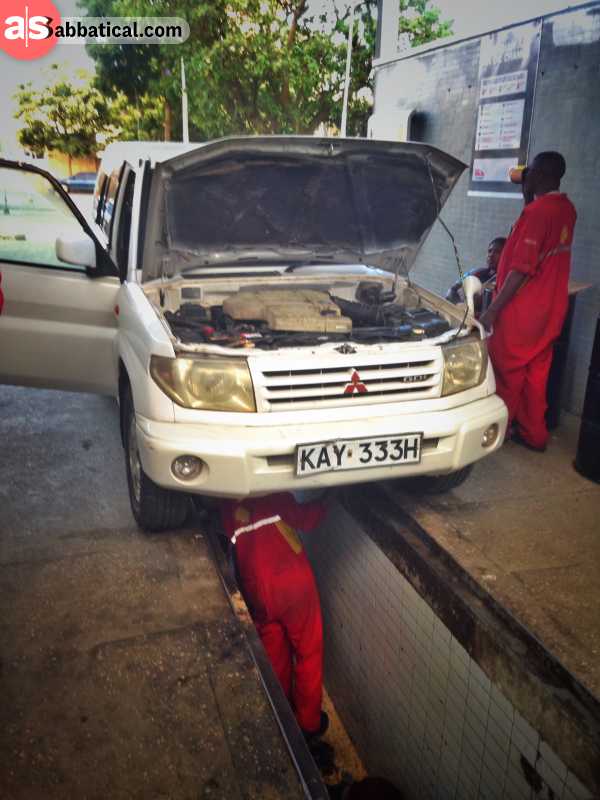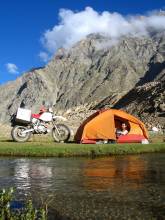Challenge of Buying a Car in Kenya (+7 Tips)
When I planned my road trip through Africa , I thought buying a car in Kenya
, I thought buying a car in Kenya would make my adventure a lot easier. Considering the lack of public transportation throughout most of the continent, and that I wanted to travel on my own time, having my own vehicle just seemed like the logical option.
would make my adventure a lot easier. Considering the lack of public transportation throughout most of the continent, and that I wanted to travel on my own time, having my own vehicle just seemed like the logical option.
I had no idea that it would turn out to be such a bureaucratic nightmare.
If you’re about to make a similar journey yourself, or if you’re an expat in Kenya, this article is for you. I realize my situation was unique, as I was on a travel visa, instead of being a registered resident. Nonetheless, I learned a lot about how local authorities handle things, and that with some time and patience, buying a car is doable.
Finding the right car to cross Africa southbound

So here’s the catch: Buying a car IS actually very simple, you just need to know the steps to get it done!
My plan was to start in Kenya, simply buy a car, and then travel down to Cape Town. I was excited and ready for an epic trip. In Cape Town I would sell the car again, or - if I had to- drive back up to Kenya, and sell the vehicle there.
Finding a car in Nairobi was the first (unexpected) challenge: Most cars cost at least twice as much as they do in Southern Africa , even if they are in a way worse condition. Of course, being a traveler and all, you don’t want to spend a fortune on a sub-par car. So there I was, in a foreign country, trying my hardest to negotiate a reasonable price. Let’s just say that wasn’t much appreciated by the car dealers, and I upset quite a few people with my low offers.
, even if they are in a way worse condition. Of course, being a traveler and all, you don’t want to spend a fortune on a sub-par car. So there I was, in a foreign country, trying my hardest to negotiate a reasonable price. Let’s just say that wasn’t much appreciated by the car dealers, and I upset quite a few people with my low offers.
Buying a car in Kenya, and the struggles that come with it...

Once you and your car owner or dealer have come to a conclusion on a price, all you have to is sign a contract with that person. Sounds pretty simple, right?
Well, you’ll run into a couple of problems right off the boat. To register your car, you need a Kenyan PIN (which is the equivalent of a social security number). As a visitor with a travel visa, you won’t receive a PIN. You’ll either need a working visa or be willing to invest a lot of money.
Now, driving around in an unregistered car really isn’t such a big deal locally, but I was planning to cross quite a few country borders. I contacted multiple officials, hoping somebody could help me find the answer. The Kenya Revenue Authority (KRA) promised me a letter of authorization, provided that I deposited the original logbook in Kenya. That seemed like a perfectly good solution, but Africa is known to have a bribe culture, and I didn’t want to risk it.
The week passed by and I was getting desperate...
FINALLY, the Kenyan AA (Automobile Association) was the one to help me out (shout out to them!). They explained that the only solid solution would be to get a ‘Carnet de Passage’ on my name. Instead of getting the KRA’s letter of authorization, I opted for the Carnet. The process was quite straightforward but still took me a few days. It seemed that - at last - I could start my adventure!
Learn more: A complete guide for Carnet de Passage in Africa!
A slight setback before the journey really starts
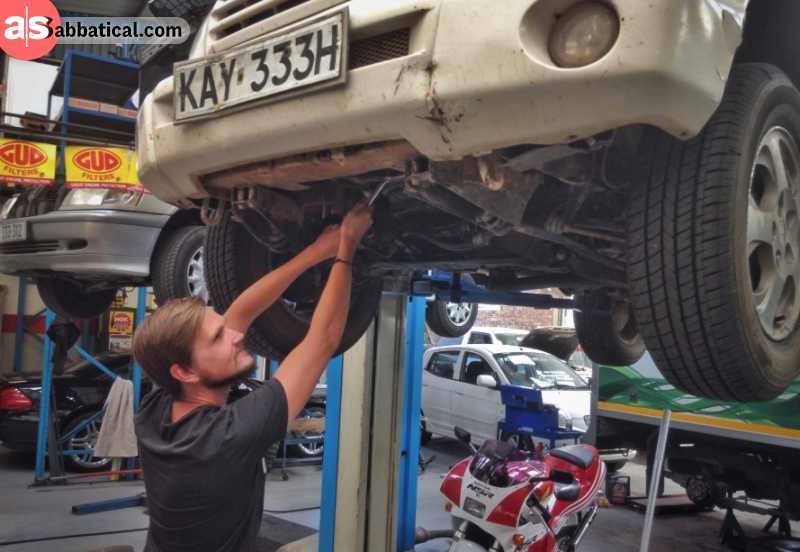
My happiness didn’t last for long… Apparently, the purchase I made wasn’t the best, and sooner than I had hoped for, my engine started giving me trouble. Replacing the engine is a project of its own since engines in Kenya need to be registered as well!
To my luck, countless bush mechanics with second-hand parts around the countries were the best thing you can wish for when it comes to a breakdown!
Now I was starting to come under some time pressure - I had already spent more time than expected on the whole buying process. I was getting just a little worried, not to mention frustrated. I ended up deciding not to register the new number, and none of the border patrols ever asked me for it. They did, however, ask for the Carnet de Passage, so I was glad to have that in my glove compartment!
Never travel by car around the world unprepared! Check out this interactive map showing the Carnet de Passage requirements for each country around the globe!
Important things to consider before buying a used car in Kenya

It is of uttermost importance to plan your trip beforehand and figure out at least the route (countries you'll travel through) and documentation needed to enter these countries by car, but there are still few more things to consider when thinking of buying a car in Kenya.
#1 What are your needs?
First things first, what are your needs when it comes to buying a car? Will you travel long distances every day? Will you maybe use the car to rest or even sleep and you want comfort and space? Will you travel mainly off-road?
It's important to answer these questions since the answers will give you the exact idea what type of car you should look for. Believe me, there is nothing worse than realizing you just bought a wrong type of car for the adventure you're planning to do!
#2 What is your budget?
The second logical thing to think about is definitely a budget. What kind of budget you're having for a car and is it enough to buy a proper car that will suit your needs.
Please have in mind that cars in Kenya are extremely expensive and some can be almost twice more expensive than the same models you can find somewhere else!
There are few online marketplaces for used cars in Kenya where you can check the prices and cars. Also, I advise you to take a look at local car dealers or even mechanics who can point you in the right direction.
Have in mind the above-mentioned fact about the high price and don't get surprised when you get an offer with a huge price for the car that is more than 20 years old. It's always advisable to negotiate, but before doing it, be sure that you've checked the prices of the car models and that you know bits about the cars.
#3 Importing the car or buying locally?
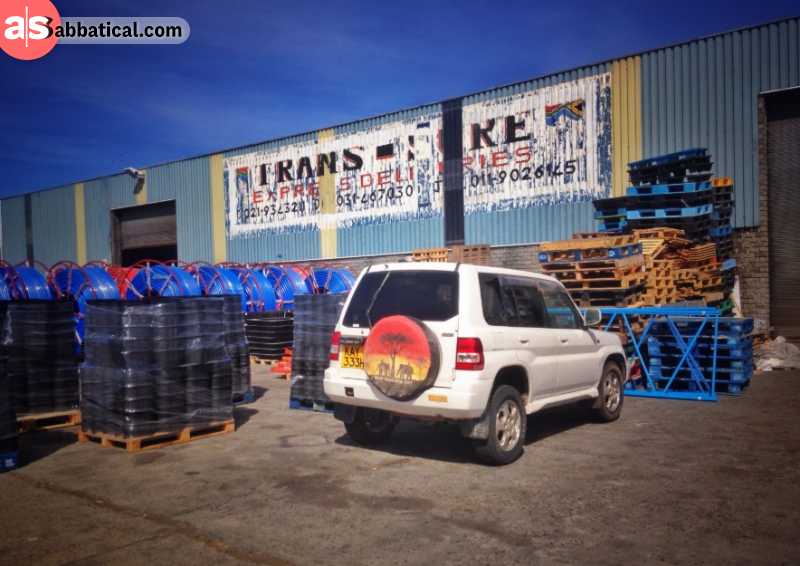
Alright, now when we sorted out the first most important questions, it's time to talk about the marketplace. There are always options to buy a car locally or import it from abroad.
Importing the car, after paying the taxes and sorting the papers, will almost always be far cheaper than buying the same car in Kenya. Why people don't import so often?
Well, the slow bureaucracy and the process of import make it unattractive for travelers who have only limited time in the country. After doing research, some people experienced waiting even more than three months for their car to be cleared from the port.
Buying locally means you get behind the wheel the same moment you pay for the car.
Both ways have the benefits and disadvantages and it's up to you to measure it and decide which is the way you're going to take.
#4 What about the spare parts?
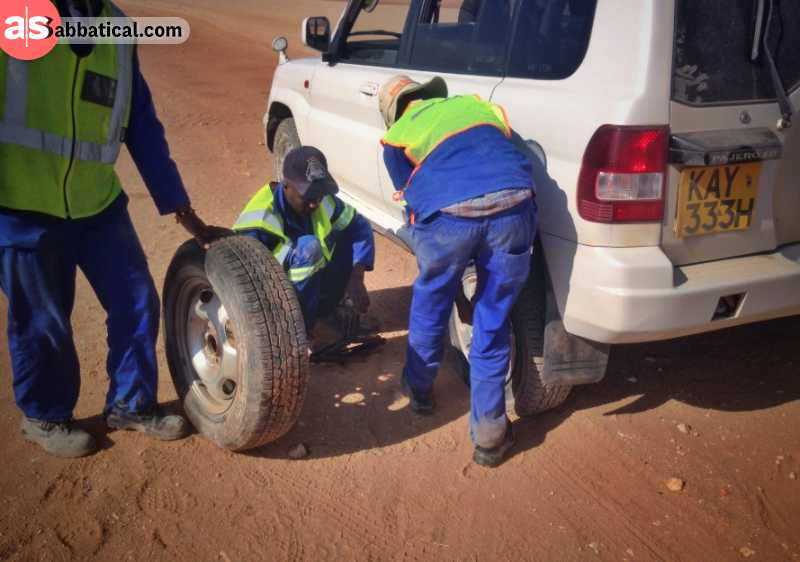
Well, breakdowns are the parts of the adventure, especially when you're driving a car that is older than 20 years. It's very important to pick the commonly used car by locals as it means the spare parts are abundant around the local shops and mechanics.
Some advice is to go with Nissan, VW, KIA, Subaru or Toyota. You can find a lot of spare parts for these cars even in some remote areas.
#5 Don't forget to check the paperwork!
Paperwork is the most important thing when it comes to driving legally around Africa since it proves you're the owner of the car. Every car that is legit should come with the original car Logbook where you can see all the details about the car and previous owner.
Also, you can check the data of Logbook online to check all of the history between the car and the owner and figure out if the car is legit.
#6 Inspect the current condition of the car
As I already mentioned, buying locally has many benefits, but also you can expect to buy a huge price for a really old car. We're talking about the cars that are at least 15 years old in the best case. It's of uttermost importance to thoroughly inspect the car and crucial parts of it.
If you don't know anything about the cars you should definitely try to find someone who you can trust and who knows about the cars. Also, there are companies that offer evaluation services and you can hire them to spot the problems with the car.
#7 Think about the insurance
Don't forget to ensure your car in Kenya! There are few renowned insurance companies in Kenya that offer different policies depending on your budget and needs. It's not that hard to get into the accident around Africa since the roads aren't the best, the lightning is almost inexistent and also the cars are very old!
What I have learned from buying a car in Kenya

In the end, I learned far more about buying a car in Kenya than I ever anticipated - or wanted for that matter. It was also a valuable lesson on the bureaucracy and authority of the country. I’m not going to lie - the not-knowing-what-was-going-on definitely gave me a headache or two.
But the Carnet de Passage did what it needed to do, and I ended up having a great trip. This trip is a perfect example of some of the struggles one may encounter when traveling independently. At the time, it was quite a hassle, but now I look back on it as a funny story.
I guess the moral of the story is that even if you might be confronted with some icky situations if you have a vision of what you want, don’t give up!



